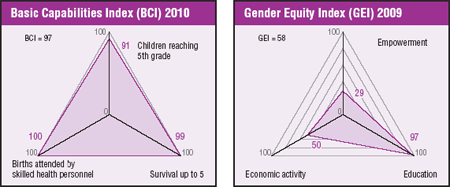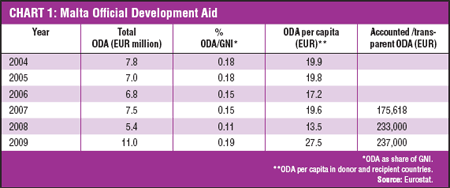Measuring the real commitment to development aid
Kopin Malta
Joseph M. Sammut
Since Malta’s accession to the EU, there has been significant progress in official development assistance (ODA). This increased by 65% in 2009 over the previous year. The country has created a promising framework for its commitment to poverty eradication in developing countries, the achievement of the MDGs and the promotion of good governance and respect for human rights. On closer examination, though, is not clear whether Malta is willing to implement its development agenda fully or only partially. The Government should develop clear criteria and processes with regard to project selection, expenditure and evaluation.
 |
Malta joined the EU in 2004 and has subsequently made efforts to reach a level of official development assistance (ODA) amounting to 0.17% of its gross national income (GNI) by 2010 and to increase its ODA/GNI ratio to 0.33% by 2015. Malta is also a signatory of the UN Millennium Declaration in which it promised to work towards achieving the Millennium Development Goals (MDGs).
Is Malta honouring these promises? Significant progress can be seen in the short span of five years (2004–2009) immediately following the country’s accession to the EU and its consequent shift to donor-country status. The Government established a written policy regarding overseas aid and became “partially” transparent in showing how the ODA funds are being distributed.
A good framework for development cooperation
In October 2007 the Government launched its first Overseas Development Policy document.[1] It is based on the values that underlie Malta’s Foreign Policy: solidarity, respect for the international rule of law – including humanitarian law – and the furtherance of democracy, human rights and good governance. In accordance with the European Consensus on Development,[2] the Policy has as its overall objective the pursuit of poverty eradication in the context of sustainable development, including the achievement of the MDGs, as well as the promotion of good governance and respect for human rights.
The document also acknowledges the important role played by non-state actors – the private sector, social and economic partners and civil society in general – who have become major players in international development cooperation. It provides the basis for a healthy dialogue between Government and civil society and offers the latter an opportunity to put into effect its valuable knowledge, experience and expertise. Like other NGOs worldwide, many of those in Malta have years of experience and fieldwork and run more development projects and programs than those funded by official aid agencies. The Ministry of Foreign Affairs (MFA) has invited NGOs recognized by the Government to submit small grant proposals for “on the ground” projects in the Global South.
The Policy acknowledges that development, especially economic development, cannot come about unless there is a secure and stable political climate in the countries receiving development assistance. It also recognizes that the lack of good governance, development and security are factors that contribute to migration as well as a brain drain in the developing world, especially if economic problems such as a high rate of inflation and unemployment prevail. Thus, the Policy provides a framework for humanitarian assistance in which Malta recognizes the continuum between emergency relief, rehabilitation and development. Post-emergency rehabilitation assistance, including reconstruction and reconciliation efforts, forms an intrinsic part of the country’s humanitarian response.
Thus, the Overseas Development Policy in itself is a good document emphasizing all important aspects of development cooperation. The question is whether the MFA is willing to implement it fully or only partially.
Not all aid is development aid
In 2004 and 2005 the European Commission (EC) showed Malta to be the highest donor among the 10 new member states with an ODA contribution of 0.18% of GNI. However, the 2006 Aid Watch Report by CONCORD,[3] states that Malta’s ODA has been deceptively doubled by including spending on refugees inside the country. Genuine ODA is understood to be money allocated as development aid to improve the welfare of the poor in developing countries and not money spent on refugees or foreign students attending school in the donor country. In addition, Malta wrote off EUR 6.5 million in debt owed by Iraq in 2004, and this was included as part of its ODA for 2003–2005.[4] The MFA refuses to issue a clear and transparent breakdown of the declarations it made to the EC on its ODA.[5]
Statistics on ODA in 2006 show a figure of EUR 6.8 million, equivalent to 0.15% of GNI. That was a decrease from previous years. In 2007, the EC said that Malta had spent EUR 7.5 million (0.15% of GNI) in ODA, while budgetary estimates show that the MFA only approved EUR 209,000 for this. NGOs believe that the rest of the money was used for other purposes such as the detention of asylum seekers. Only two out of 11 grants focused on Africa: a Rotary Club project for a telecoms centre in Eritrea and a contribution to a Belgian Red Cross HIV action plan in Libya. The other aid outlays included assistance for the construction of playgrounds in Bethlehem and a container sent to Albania; donations to the Commonwealth Secretariat, international institutions such as the United Nations and related relief funds; conferences; and money for a Tunisian Christian cemetery and the Diplo Foundation. Another donation was to a private company for the construction of the MFA stand for the European Development Days held in Lisbon.[6] Maltese NGOs working on development aid have therefore accused the Government of inflating its aid figures.[7]
The figures for 2006 and 2007 were also highly criticized by Concord[8] since the ODA seems to have been primarily spent on migrants, either on services during their first year in Malta or on their repatriation. This money is not helping any country to develop and thus should not be counted as ODA. In addition, a number of scholarships are given each year to people from developing countries with no mechanism to indicate whether these are contributing to poverty alleviation.
Transparency is needed
 |
During discussion with European institutions and in international meetings, Malta's Minister of Foreign Affairs started pushing conditionality of development aid to include the repatriation of migrants.[9] SKOP, the National Platform of Maltese NGOs, has serious reservations about the proposal and considers that it undermines the rightful focus of ODA, namely tackling global poverty. Concord’s Aid Watch 2007 report further states that NGOs currently have no access to official information from the Maltese authorities and describes the possibility of an independent evaluation of figures given by the Government as "non-existent." SKOP has also been asking the Government for a transparent breakdown of Malta’s ODA, but this has not been released. The lack of transparency and of the timely and independent evaluation of Maltese aid compromises NGO engagement on development cooperation issues.
Dr Tonio Borg, the Minister of Foreign Affairs, stated during a seminar on the MDGs that “there is nothing essentially wrong in using ODA money towards refugees because we are offering assistance – whether it is search and rescue, accommodation or food – which covers the livelihood of people who are in need and who arrived in Malta and who will, ultimately, be released.” [10] This confirmed the concerns that NGOs have long been expressing. Moreover, referring to Malta's official policy, the CONCORD report states that the Government has also indicated that more aid funds will be allocated for technical assistance. NGOs are concerned that, in general, technical assistance does not respond to the real needs of developing countries and suffers from low accountability.
Replying to a parliamentary question tabled by Labour MP Leo Brincat in June 2008,[11] the Minister said that Malta’s only obligation was to inform the EC of the global ODA figure and what it amounted to in relation to the GNI, to ensure the country was abiding by its commitments enshrined in the MDGs.
In 2009, Malta pledged EUR 11 million in ODA, an increase of 65% over the previous year. The Government accounted for EUR 237,000 to finance 80% of projects by Maltese development NGOs.[12] The Ministry requires civil society organizations to finance 20% of their respective projects from alternative sources. The funds were provided to nine local NGOs to carry out projects in Africa and one in South America to help in fighting poverty. Two donations of EUR 12,750 and EUR 12,224, respectively, were made to the Bethlehem University and to a hospital in Jerusalem, both of which offer their services to local residents regardless of their race, religion or nationality.
Recommendations
Malta must keep its promises towards the poor countries in the Global South. ODA has to focus on contributing to the eradication of poverty in the least developed countries. The Government should work to increase the delivery of genuine aid resources to meet the respective 2010 and 2015 targets. The country should devise a development strategy having poverty reduction goals as the main criteria for the allocation of aid and a specific focus on gender-related issues such as commitments towards gender equality and women’s empowerment.
ODA should not be inflated by adding the costs of housing refugees. Instead, the Government should make full use of the aid offered by the EU for refugees and asylum seekers. During his visit to Malta in 2009, Jacques Barrot – then EU Justice Commissioner – reiterated that the island had been allocated over EUR 126 million in funds to spend from 2007 to 2013 in the field of asylum, immigration and borders. Barrot observed critically that the country had only spent EUR 18 million. According to estimates published in the local press, Malta was allocated EUR 24.4 million in 2007, EUR 32.5 million in 2008 and EUR 18 million for each year until 2013, plus other entitlements and grants for situations that may arise. This aid should be fully utilized.[13]
The MFA should develop clear criteria and processes with regard to project selection, expenditure and evaluation. Consultation with receiving countries’ governments and civil society is important for quality development aid. It is necessary to establish a binding timetable in order to achieve the agreed targets with real aid resources, and to ensure that steady increases in their aid budgets allow the recipients to reach the targets by the agreed deadlines. Transparency is a major factor in a democratic country. Citizens have the right to be informed what tax money is being spent on, which includes a clear analysis of the ODA figures. This will also serve as an example of good governance for the receiving countries.
Global citizenship and development education should be integrated into the teaching of Maltese students. Education should help to increase young people’s sense of responsibility for eradicating world poverty by teaching them democratic principles, nurturing respect for the rule of law and human rights, showing solidarity and joining others in efforts to strengthen global partnership. This should help to raise their sense of connectedness with sisters and brothers in developing countries and improve the effectiveness of development cooperation.
[2] Adopted during the European Council on 15-16 December 2005. Available from:
<www.enpi-programming.eu/wcm/dmdocuments/EU-consensus-development.pdf>.
[3] The report on Malta is authored by SKOP, a national platform of Maltese NGOs. See: CONCORD, Aid Watch 2006. Available
[4] C. Calleja, “Blessed are the poor,” Times of Malta, 16 April 2006.
[5] Ibid.
[6] M. Vella, “Malta aid figures show little cash reaches world’s poorest,” Malta Today, 16 November 2008. Available from: <www.maltatoday.com.mt/2008/11/16/t8.html>.
[7] I. Camilleri, “Malta accused of inflating its development aid,” Times of Malta, 23 May 2008.Available from: <www.timesofmalta.com/articles/view/20080523/local/malta-accused-of-inflating-its-development-aid>.
[9] Ibid.
[10] C. Calleja, “Refugees get lion's share of funds meant for overseas aid,” Times of Malta, 18 October 2008.Available
[11] L. Brincat, Malta Parliament, 2008. Available from: <www.parliament.gov.mt/file.aspx?f=545>.
[12] “Overseas Development Aid 2009,” 3 November 2009. Available from: <www.foreign.gov.mt/default.aspx?MDIS=21&NWID=664>.
[13] “Only €18 million spent from €126m in EU migration funds,” Malta Today, 18 March 2009. Available from: <www.maltatoday.com.mt/2009/03/18/t2.html>.


